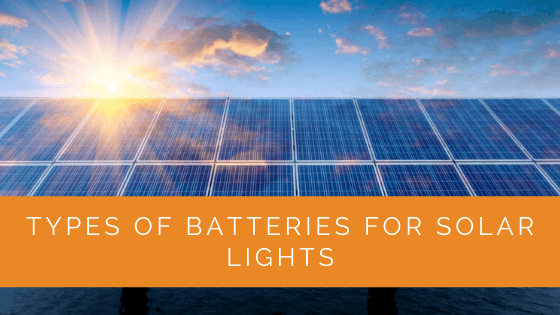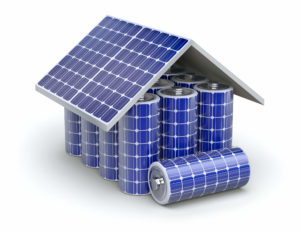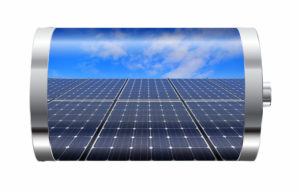Solar lights have become one of the most trending products to illuminate both residential and commercial spaces. If you plan to install solar lights, it’s ideal for getting some first-hand information about its technicalities.
Out of all the other components in the solar lights, the batteries are the most important. It is essential to understand the different batteries as the performance of solar lights largely depends on them.
Should you go with lithium-Ion batteries, nickel-cadmium batteries, or other variants? This article outlines five types of batteries for solar lights.
Here, we have introduced each battery type and listed its pros and cons. This article will help you identify the battery type that will complement your solar lights the best. Read on to know more!
Contents
Key Takeaways
- The performance of solar lights depends heavily on the type of batteries used, and there are several options available, including Lead-Acid, NiCad, NiMH, Li-ion, and LiFePO4 batteries.
- Lead-Acid batteries are economical but have a short life cycle and slow charging times, while NiCad batteries offer good performance but are toxic and have high self-discharge rates.
- NiMH batteries are environmentally friendly with good capacity but suffer from quick self-discharge, while Li-ion batteries are versatile, low-maintenance, and safe, but they can degrade in high temperatures. LiFePO4 batteries are efficient, durable, and safe but come at a higher cost.
What Are the Types of Batteries for Solar Lights?
This section will walk you through the different types of batteries available for solar lights. We’ve broken it down with their pros and cons to help you make the best choice.
Hence, let’s get to know your solar light batteries better!
Lead-Acid Battery
Though the weight of lead-acid batteries might be concerning, their economical price offers a huge plus point. Its affordability makes it suitable for large applications such as UPS systems, solar-driven systems, cars, and wheelchairs.
Most buyers prefer this battery for its reasonable cost, unlike other advanced technologies. However, note that these batteries have a short life cycle.
The lead-acid batteries have been able to sustain their market share as the new batteries are too expensive.
The charging time for lead-acid batteries usually ranges between 8 hours and 16 hours. Its slow charge time can be a drawback for many applications. Moreover, deep-cycling might not be the best option for lead-acid batteries.
Pros:
- Its periodic charge is entirely saturated. Hence, there is no sulfating.
- Compared to newer battery types, lead-acid batteries are inexpensive.
- Lead-acid batteries have quicker discharge rates.
- They are reliable, durable, and provide dependable performance.
- These batteries are easily rechargeable.
Cons:
- It is not safe to store lead-acid batteries in the discharged state.
- These batteries have a low energy density.
- Incorrectly charging these batteries might result in a thermal runaway.
- The content of lead-acid batteries is harmful to the environment.
- Lead batteries have limitations in their total discharge cycles.
- These have a risk of explosion.

NiCad (Nickel Cadmium) Battery
NiCad batteries are rechargeable batteries with significant benefits over their lead-acid counterparts. These batteries have been a popular choice since 1990 because of their standard sizing.
Along with being rechargeable, these batteries do not suffer from voltage drops during low-charge conditions. On the other hand, alkaline batteries can face a voltage drop up to 0.9 V.
The good news is that NiCad batteries maintain their performance until they are completely discharged.
Despite their low energy, people prefer NiCad batteries because of their economical pricing and long lifespan. But, you should also know that NiCad is not good for the environment.
NiCad batteries contain many toxic compounds. Additionally, these batteries are heavy and can die rapidly.
Pros:
- It offers superior performance even at low temperatures.
- NiCad batteries are available in different performance and size options.
- It is one of the most economically priced batteries, making it apt for budget buyers.
- Longevity is another plus point of NiCad batteries.
- These batteries have an ultra-fast charging time.
- These allow rugged and heavy-duty use.
Cons:
- They are high self-discharge batteries that require recharging even after storage.
- The batteries have a low cell voltage of 1.20 V.
- The disposal of NiCad batteries is tricky as they are toxic to the environment.
- These batteries need a periodic complete discharge.
- Compared to newer technologies, NiCad batteries have relatively low energy.
- NiCad batteries are prone to the memory effect.
NiMH (Nickel Metal Hydride) Battery
NiMH is one of the most revolutionary battery types due to its significantly advanced technology. Compared to NiCad, NiMH batteries have 30% better capacity and are not very susceptible to memory effects.
Nickel metal hydride batteries are also among the most common battery types for solar lights. Though this battery was developed in the 1960s, it became commercially available only in the 80s.
These days, you’ll notice that NiMH batteries come with an environment-friendly label. It is because these batteries do not include any toxic chemicals, which also makes their disposal effortless!
These batteries are lighter, less costly, and safer compared to their lithium buddies. Also, the batteries are capable of holding more electric charge even with their compact sizes. One of the most significant drawbacks of this battery is the quick self-discharge rate.
Pros:
- They are superb alternatives to alkaline batteries.
- Users will find the recharging process for this battery pretty easy.
- The high power density is a significant plus point.
- Nickel metal hydride batteries do not include any toxic materials, and hence, are environment-friendly.
- They are available in standard sizes.
Cons:
- Their performance will degrade over time if you store them in elevated temperatures.
- These are more expensive than other batteries.
- NiMH batteries self-discharge at a pretty high rate.
- Their service life is below average.

Li-ion (Lithium-Ion) Battery
Li-ion batteries are the most commonly available batteries in the market. Apart from solar lights, you’ll spot Li-ion batteries with almost all devices. In our opinion, lithium-ion batteries pack quite promising chemistry.
These batteries have an incredible high acceptance in the market. The batteries have the potential for a higher energy density. You’ll also love the fact that these batteries do not demand much maintenance.
Plus, unlike other batteries, you don’t have to treat them with memory cycling to extend their shelf life. Due to its slow self-discharge, these batteries are the top choice for solar lights.
One of the most amazing perks of picking solar lights with Li-ion batteries is safety. These batteries are not toxic and are relatively easier to dispose of.
Pros:
- A battery with high energy density
- This battery demands relatively low maintenance
- There are many varieties of Li-ion batteries available in the market
- Due to its improved resistance to overcharge, these batteries are safer
- The overall weight of the battery is light
- No requirement for priming
- The rounds of charge and discharge cycles are much higher
- This battery can withstand a higher voltage operation
- The low self-discharge rate is another unique benefit
Cons:
- Lithium-ion batteries are unavailable in standard sizes
- When you expose them to high temperatures, they degrade pretty fast
- It is relatively more expensive than other modern batteries
- These batteries can suffer from aging
- Requires a protection circuit
LiFePO4 (Lithium-Ion Phosphate) Battery
Lithium-ion phosphate batteries are compact and come with a heavy price tag. You can consider these batteries as an improved variant of Lithium-Ion Phosphate batteries.
In comparison to Li-ion batteries, these new and improved versions have a lower voltage drop. Due to many such features, Lithium-Ion Phosphate batteries are among the most advanced and effective products in the market.
Even with the smallest-sized solar panels, these batteries work wonders. What’s more, the batteries have a service life of 9 to 12 years. Most consumers also appreciate the minimal maintenance required for these batteries.
Since these batteries can tackle extreme temperatures, they are fit for outdoor use as well. The LiFePO4 batteries offer excellent performance in different temperature ranges. A few other benefits of this battery include its quick charging and environment-friendliness.
You might be tempted to buy solar lights that feature LiFePO4 batteries. If so, stay prepared to shell out a heavy amount out of your pocket.
Pros:
- These batteries are among the safest alternatives for the environment.
- Due to their high power density, they are relatively light in weight.
- This battery is highly efficient due to its quick charging and discharging rates.
- It can withstand extreme temperatures, making it suitable for outdoor use.
Cons:
- Lithium-ion phosphate batteries are one of the costliest batteries out there.
- Their performance in low temperatures is relatively poor.
- These batteries need protection.
- Compared to Li-ion batteries, these batteries have a lower energy density.
- The tap density only ranges between 0.8 to 1.3.
- These batteries might not be available readily.
Case Study: Enhancing Residential Solar Lighting with Optimal Battery Selection
Background
At Solar Panels Network USA, we are committed to providing top-tier solar lighting solutions tailored to our customers’ unique needs. One of our recent projects involved installing a comprehensive solar lighting system for a residential property. Our goal was to deliver a reliable, cost-effective, and environmentally friendly solution by selecting the optimal battery types for their solar lights.
Project Overview
The homeowners, a family looking to reduce their carbon footprint and electricity costs, required a solar lighting system that could withstand varying weather conditions while ensuring consistent performance. We proposed a mix of lithium-ion and lithium iron phosphate (LiFePO4) batteries due to their proven efficiency, durability, and safety features.
Implementation
Our implementation strategy was meticulous, focusing on every detail to ensure the highest quality and performance of the solar lighting system.
Site Assessment and Design
We conducted a thorough site assessment to understand the layout, sunlight exposure, and specific lighting needs of the property. This step was crucial to ensure the optimal placement of solar panels and lights, maximizing their efficiency and performance.
Battery Selection
Given the homeowners’ needs, we recommended lithium-ion batteries for their low maintenance, high energy density, and slow self-discharge rates. For areas requiring higher energy output and faster charging, such as outdoor security lights, we selected LiFePO4 batteries due to their robustness and efficiency.
Installation
Our team installed the solar panels in locations with maximum sun exposure, ensuring that the batteries would receive sufficient charge throughout the day. The lithium-ion batteries were integrated into the main lighting system, while LiFePO4 batteries were reserved for high-demand areas.
Testing and Optimization
After installation, we conducted extensive testing to verify the performance of the solar lighting system. We adjusted the system configurations to ensure optimal energy use and battery longevity, addressing any issues that arose during testing.
Results
The installed solar lighting system exceeded the homeowners’ expectations, providing reliable and consistent lighting across their property. The lithium-ion batteries required minimal maintenance and performed efficiently, while the LiFePO4 batteries ensured quick charging and sustained high energy output even during periods of heavy use.
Performance
The lithium-ion batteries demonstrated excellent performance with a low self-discharge rate, ensuring that the lights remained bright and reliable. The LiFePO4 batteries, known for their durability, provided robust support for high-demand lighting applications, maintaining their charge and efficiency.
Cost Savings and Environmental Impact
The family noticed significant savings on their electricity bills, aligning with their goal of reducing household expenses and environmental impact. The choice of advanced batteries contributed to the overall sustainability of the solar lighting system.
Summary
This case study highlights the importance of selecting the right batteries for residential solar lighting systems. By leveraging the strengths of lithium-ion and LiFePO4 batteries, we delivered a solution that combined efficiency, durability, and environmental responsibility. At Solar Panels Network USA, we continue to prioritize innovation and customer satisfaction in our solar energy solutions, ensuring that every project meets the highest standards of performance and sustainability.
Expert Insights From Our Solar Panel Installers About Types of Batteries for Solar Lights
Lead-acid batteries are a solid choice for larger applications due to their affordability, though they come with the trade-off of a shorter life cycle. In my experience, they work well for users on a tight budget who need reliable, if not cutting-edge, performance.
Senior Solar Technician
Nickel-Cadmium batteries offer longevity and perform reliably even under low temperatures. However, their environmental impact due to toxic compounds makes them less favorable. I often advise customers to weigh these pros and cons carefully.
Lead Installer
Lithium-Ion batteries are highly versatile and require minimal maintenance, making them a preferred choice for many of our installations. Their low self-discharge rate and high energy density make them especially suitable for solar lights.
Solar Energy Consultant
Our Expertise in Solar Lights
At Solar Panels Network USA, we’re here to provide you with valuable information and support regarding solar lighting. With our experience and understanding of the solar lighting industry, our team of experts is prepared to assist you in finding the right lighting solution for your needs. Whether you’re interested in improving your outdoor spaces, conserving energy, or adopting a more sustainable approach, we’re well-equipped to help. Please feel free to contact us with any questions or inquiries.
Conclusion
Most buyers tend to neglect battery-related features while buying solar lights. However, the performance of your solar lights depends on the battery type.
Each battery listed in this article has unique benefits and applications. The primary goal of outlining the pros and cons of each battery is to help you select the best option to suit your needs. The energy requirements, budget, and weather conditions will affect your choice of battery.
Besides, your solar lights will perform well as long as the batteries can keep up with the demands. Hopefully, with this information on the types of batteries for solar lights, you’ll be able to pick wisely.
About the Author
Solar Panels Network USA stands at the forefront of solar energy solutions, driven by a team of seasoned solar engineers and energy consultants. With over decades of experience in delivering high-quality solar installations and maintenance, we are committed to promoting sustainable energy through customer-centric, tailored solutions. Our articles reflect this commitment, crafted collaboratively by experts to provide accurate, up-to-date insights into solar technology, ensuring our readers are well-informed and empowered in their solar energy decisions.



